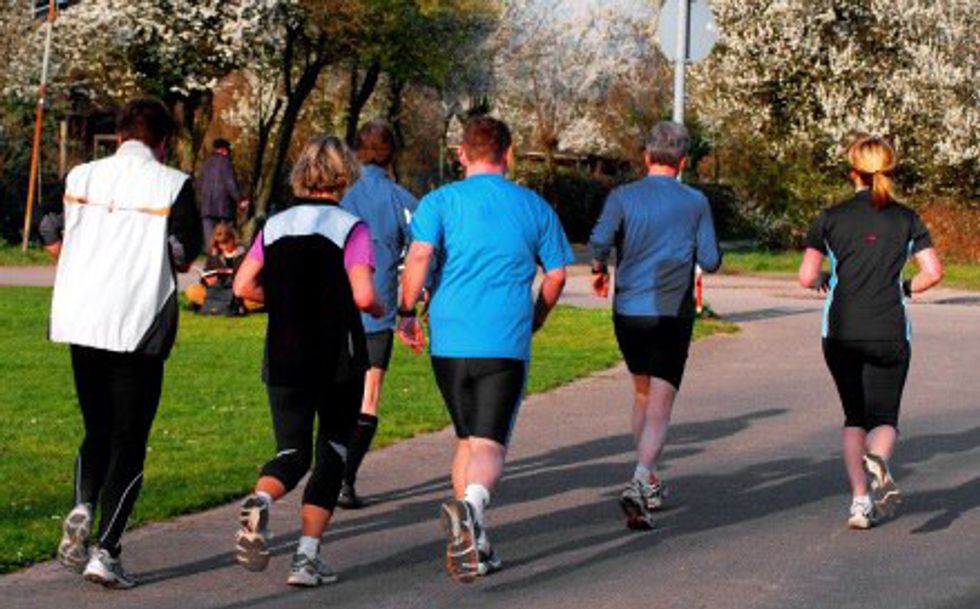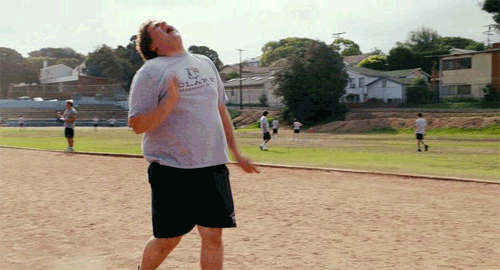While all you technically need to do is lace up your sneakers to get started with your running routine, turns out there’s way more need-to-know information. Before you jump the gun and experience everything from painful blisters to chafing to unsupported bosoms — there are some basic tips and tricks to smoothing your transition from nonrunner to runner. People wish they had heard them before they spent years circling the track, padding along the trails and grinding it out up steep hills. If you're just starting out on your own journey pounding the pavement or treadmill belt, forget about learning the hard way — you can steal their secrets right here, right now.
1. Be patient.
2. Be consistent.
Pick an appropriate training schedule- meaning begin your training based off of where your fitness level is right now. Just like Goldilocks and the Three Bears, it has to be just right- not too strenuous, and not too easy. If the plan is too hard to live up to, you risk getting injured and becoming discouraged- a set up for failure. When you reduce injuries, you miss fewer training opportunities, and when you get stronger, you miss fewer training opportunities because your body can handle the stress that running puts on your joints, tendons, ligaments and bones.
3. It's OK to walk.
4. A foam roller will become your best friend.
Most runners will have at least heard of the foam roller, or encountered it in a gym, but it is often that many are not sure in how to actually use it. The same can be applied to other things beneficial to running, that don't involve running itself- dynamic stretching, core work, and exercises to target and strengthen the body. But in this case in particular, when used correctly, can release tension and tightness between the muscles and fascia which surrounds the muscle or group of muscles. This built up tension is perhaps caused by repetitive patterns or your own work out. The point is to use your body weight and move at your own pace- if one area hurts more than another, go gently, and if not press harder. More "weight" is added as the muscles relax. While it can warm the body up quickly by increasing the blood flow, it can furthermore flush out toxins as a cool down in your post-run.
5. Never judge a run by the first mile.
6. Pick a running partner.
Every runner started with the first mile. Running buddies are there because they want you to succeed. Join a club, sign up for a race or find a friend who will offer you the kind of pick-me-ups that can help you go the extra distance.
7. Rest.
Many fitness junkies find the idea of taking a day off as a device of Satan, meant to help us fall off track and regain all those little things we were trying to get rid of. Whatever your reason for working out may be, we all need a day off sometimes. While you may beg to differ, rest days are actually implemented in many professional training plans in order to allow the body time to recuperate. Within each work out is a greater strain on our muscles, tendons, ligaments, bones, and joints. For every rest day not provided, our immune system has to work that much harder in terms of functioning because there is a consistent stress and muscle or joint tears that come with a continual practice. Similar to the muscle builder and lifter, a running should take a day off from exerting the same region so reparation can occur which also decreases the risk of injury. Not to add fear into your head, but high-impact sports such as running lower extremities to a level that has the ability to crack bones and tighten muscles if not treated properly. This could mean tight calf muscles, bone spurs, shin splints (more commonly), muscle tears, or tendon shears. So ask yourself if that ONE day off is feasible. Agreed it can also depend on your level of fitness, for example, if you’re just now starting out in the fitness world, your rest day should probably be a real rest day in which you do not do any activity at all. A more seasoned athlete has a greater tolerance for continuing to do some light activity during a rest day. Give your body what you know it needs and deserves, and recognize that every single athlete does this.
8. Stay hydrated.
From the stuff we drink and swim in, to the steam that eases congestion, water is all around us- and even in us. In a way it basically is us. According to CamelBak hydration expert, Doug Casa, PhD, "Water makes up about two thirds of who we are, and influences 100 percent of the processes in our body." That probably explains why we feel better when we are drinking enough of it. Not only does it replace lost fluids in times such as warmer weather exercise or worse, colder, but it powers our brain into thinking more clearly, and fighting fatigue or headaches. Dehydration causes brain shrinkage of brain tissue, so when we have not had a sufficient amount of water, our brains are forced into maintaining performance at the same level but with more work added. It also protects our joints and cartilage, and keeps things moving- digestion-wise. Water helps us dissolve fats and soluble fiber. Drinking enough prevents constipation and also reduces the burden on the kidneys and liver by helping to flush waste products. In short you should go grab a bottle right now.
9. Run without music.
10. Sneakers are important, but they're not everything.
Just because your shoes did not have that special logo on them or cost nearly half of what the person next to you paid for does not reflect your performance. The only advice I would suggest is knowing when to switch out your running shoes ideally once you've covered 400 to 500 miles. But even before they wear, buy a new pair and rotate them for a while. Don't wait until your only pair is trashed.
11. Eventually add some cross training to your routine.
12. Be realistic—don't over push body.
While there’s nothing wrong with making health a priority, your body is only designed for (x) amount of exercise and needs all of the necessary nutrients to keep running. You shouldn’t be training for hours upon hours a day. Your workouts should be limited to 45-60 minutes. After this window, cortisol levels spike and muscle-building testosterone declines. Your multi-hour workout will become counterproductive. Don’t overdo it! Your workouts should challenge you slightly; some moments may feel hard, but doable. There are so many benefits to exercise, but if a person is exercising excessively even the greatest benefits such as positive mood and better sleep start to fall away.
13. Stay fueled.
Fueling your new activity is very important, and even more than that is the timing of it all. Water-rich fruits and vegetables like cucumber, watermelon, and strawberries contain minerals, salts, and natural sugars the body craves for optimum hydration levels, so eating them can sometimes rehydrate us more effectively (and a lot more flavorsome) than water alone. It's a good rule of thumb to eat about 200 to 400 calories of mostly complex carbohydrates and a little protein about an hour and a half prior to your run. This will give your body time to digest the food and provide your body with the needed energy for your activity. Not eating or not eating enough before your run can make your run feel labored or cause your muscles to feel fatigued.
14. Train your brain.
Ninety percent will be mental the longer you run. Your body will be physically exhausted, but your mental state and will power will bring you so much farther.
15. Stretch.
16. The 10-Percent Rule
As someone learning how to start running, your main priority is to run steadily, and allow your body to get used to running. Two or three days of running 1 to 4 miles works well depending on your fitness level. Don't increase your mileage every week; going too far too fast before your body is ready is one of the most frequent causes of injuries like shin splints, IT band syndrome, and runner’s knee, which sideline many people. You can stay injury-free by gradually building up the time you spend walking and running, increasing the time by no more than 10 percent from week to week is the safest route.
17. Running outside is harder than the treadmill.
18. Breathe.
19. Capitalize on the high.
I never truly understood the desire to participate in competitive running- until the moment I signed up and did so. Like many, I by no means had an easy time with my pre-race mentality- running a race can turn into a negative, shaming process, where the record player in your head is stuck on the fear of it all. But picture this: imagine a balloon is pulling you forward, and attached to it is all those who love you. This idea in sensing the possibilities with the help of your support system leads to an awareness in a world that is in constant flux and always changing. What we know as truth today may very well be proved fiction by the time the sun comes up tomorrow. Because of this, the "right" or "best" way of doing things is always changing. What this demands of you if you would like to keep pace in your sport, field, or life is that you must try to maintain an open mind or beginner's mind. Be curious, and never stop learning. The runner's high is for real. It only happens occasionally, but for each individual they are distinct flashes- running alone, distance running, running with music, and so on; however, running will always encompass some type of "high" just generally on a smaller scale. It is the sort of feeling that makes that early morning run something of a prize, or knowing you have accomplished greatness even if it means you are your own cheerleader. Keep with this momentum and plan new goals.









































